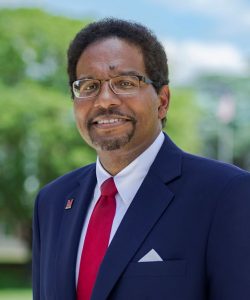
Darryll J. Pines
Darryll J. Pines serves as president of the University of Maryland as well as the Glenn L. Martin Professor of Aerospace Engineering.
As dean for 11 years, Pines instituted sweeping changes to improve the student experience, including revamping teaching in fundamental undergraduate courses; encouraging participation in national and international student competitions; emphasizing sustainability engineering and service learning; and expanding innovation and entrepreneurship activities.
Students have consistently taken top honors in the U.S. Department of Energy’s Solar Decathlon, placed fifth in Elon Musk’s global Hyperloop pod design competition and hold the world record for human-powered flight duration. Among other out-of-the-classroom opportunities, the Clark School’s Engineers Without Borders chapter is considered one of the nation’s best. The school also launched Startup Shell, the first student-run business incubator on a university campus in the United States, and its students helped create two major hackathons, Bitcamp and Technica, the first all-female and non-binary hackathon on a university campus.
As a result of investments in targeted recruitment, advising, STEM outreach and its signature Keystone Engineering Education Program, the Clark School’s one-year undergraduate retention rate stands at 91% and its five-year graduation rate at 75%, which rank in the top 10 among public flagship universities in the United States.
Pines also made diversity a hallmark of his tenure as dean. As a co-principal investigator, the university became a National Science Foundation (NSF) ADVANCE grant recipient to further develop a culture of inclusive excellence, focused on improving work environments, retention and advancement of tenured and tenure-track women faculty in ways that improve the culture for all faculty. At the engineering faculty level, the number of tenured/tenure-track women faculty more than doubled from 18 to 37, and the number of under-represented minority faculty increased from 11 to 19. At the undergraduate student level, the number of enrolled women undergraduates rose from 18% to 26.5%, and the number of enrolled underrepresented minority undergraduate students grew from 9.5% to 16%. According to Diverse Issues in Higher Education, the Clark School ranks among the top 10 in conferring the most B.S., M.S. and Ph.D. degrees to African-American students.
Pines has testified before Congress about the importance of K-12 STEM education for all students, and led an initiative to pilot a first-of-its-kind, nationwide, pre-college course on engineering principles and design. The program, Engineering For US All (E4USA), was made possible through a $4 million NSF grant. In addition, Pines in 2015 served as chair of the National Academy of Engineering Frontiers in Engineering Education Symposium.
The Clark School is also a research powerhouse, with more than $137 million in annual expenditures in eight departments and six institutes, more than 130 laboratories and 23 research centers. Under Pines’ leadership, the college established five interdisciplinary research centers and institutes: the Maryland Energy Innovation Institute, Robert E. Fischell Institute for Biomedical Devices, Maryland Transportation Institute, Quantum Technology Center (jointly with the Department of Physics) and Maryland Robotics Center. Research accomplishments ranged from revolutionary, safer energy storage techniques to the development of futuristic materials and quantum technologies.
The Clark School led the university in fundraising while Pines was dean, raising $240 million of the achieved $1 billion goal of the Great Expectations campaign ending in 2013. Among the results was A. James Clark Hall now a hub on campus and across the state for bioengineering. In the current Fearless Ideas campaign, Pines and his leadership team secured a $219.5 million investment—which in 2017 was the sixth-largest gift ever to a public university—from the A. James & Alice B. Clark Foundation. The Building Together: An Investment for Maryland gift is funding need-based scholarships campuswide, as well as graduate fellowships, faculty positions, infrastructure and other initiatives. One signature element of this investment is support for the Emilio Fernandez IDEA Factory, an innovative facility to encourage transformative ideas that have a positive impact on people and society.
Prior to his promotion to dean, Pines led the Department of Aerospace Engineering for four years, taking a leave of absence from the University of Maryland from 2003 to 2006 to serve as a program manager for the Tactical Technology Office and Defense Sciences Office at the Defense Advanced Research Projects Agency (DARPA). He also held positions at the Lawrence Livermore National Laboratory (LLNL), Chevron Corp. and Space Tethers. At LLNL, Pines worked on the Ballistic Missile Defense Organization’s Clementine spacecraft program, which discovered water near the south pole of the moon. A replica of the spacecraft now sits in the National Air and Space Museum.
Pines’ research focuses on structural dynamics, including structural health monitoring and prognosis, smart sensors, and adaptive, morphing and biologically inspired structures as well as the guidance, navigation and control of aerospace vehicles. He holds seven co-authored patents with his students and collaborators.
In recognition of his contributions to the field, Pines was named a fellow of the American Institute of Aeronautics and Astronautics, American Society of Mechanical Engineers and Institute of Physics. He chairs the Engineering Advisory Committee for NSF’s Engineering Directorate and sits on the Board of Trustees for Underwriters Laboratory not-for-profit arm. Pines received a B.S. in mechanical engineering from the University of California, Berkeley. He earned M.S. and Ph.D. degrees in mechanical engineering from the Massachusetts Institute of Technology.
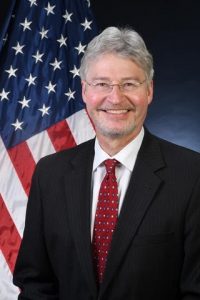
Walter Copan
Dr. Walter G. Copan was confirmed by Congress as Under Secretary of Commerce for Standards and Technology and NIST Director on October 5, 2017. As NIST Director, Dr. Copan provides high-level oversight and direction for NIST.
Dr. Copan formerly served as president and CEO of the IP Engineering Group Corporation, providing services in intellectual property strategy, technology commercialization and innovation. Until June 2017, he was founding CEO and chairman of Impact Engineered Wood Corporation, an advanced materials technology company. He also is a founding board member of Rocky Mountain Innovation Partners, where he led technology transfer programs and innovation services on behalf of the U.S. Air Force Academy, U.S. federal labs and academic institutions and helped foster entrepreneurial businesses in the Rocky Mountain West. He also served with the National Advisory Council to the Federal Laboratory Consortium for more than 5 years, providing industry inputs to advance the U.S. economic impacts of the federal laboratory system.
From 2010–2013, Dr. Copan served as managing director of Technology Commercialization and Partnerships at DOE's Brookhaven National Laboratory (BNL). Among his accomplishments were leading the creation and implementation of the new DOE technology transfer mechanism, “Agreement for Commercializing Technology” (ACT), to facilitate collaborations between the federal labs and U.S. corporations. He led the “Startup America” initiative on behalf of DOE for entrepreneurial business creation, and he initiated the DOE’s new Small Business Innovation Research – Technology Transfer (SBIR-TT) program, which built upon the experiences of NIST. He served as founding partner and board member of the “Accelerate Long Island” alliance for innovation, economic development and early stage investment.
From 2005–2010, Dr. Copan was executive vice president and chief technology officer at Clean Diesel Technologies, Inc., an international technology development and licensing firm. He spearheaded the company’s transformation, growth and listing on NASDAQ (CDTI), as well as the company’s subsequent merger. Prior to joining CDTI, Dr. Copan served at the DOE’s National Renewable Energy Laboratory (NREL) as Principal Licensing Executive, Technology Transfer. There, he led organizational changes that strengthened relationships with industry and the investment community, and led to the more productive commercialization of energy-related technologies.
After earning dual B.S./B.A. degrees in chemistry and music from Case Western Reserve University in 1975, Dr. Copan began his career in chemicals and materials research at the Lubrizol Corporation (now part of the Berkshire Hathaway Group). He earned a Ph.D. in physical chemistry from Case Western in 1982, and subsequently held leadership positions at Lubrizol in research and development, strategy, business unit management, venture capital, and mergers, acquisitions and strategic alliances in the U.S. and abroad. As managing director, Technology Transfer and Licensing, from 1999–2003, he was responsible for Lubrizol’s corporate venturing and open innovation, technology strategy, business development, intellectual assets and the technology licensing business.

Steve Rolston
Steve Rolston received his B.S. from Wesleyan University and his Ph.D. from the State University of New York at Stony Brook.
Rolston is a Fellow of UMD’s Quantum Technology Center, the JQI, the American Physical Society, the Optical Society of America, and the American Association for the Advancement of Science. He is the recipient of the Arthur S. Flemming Award, the Sigma Xi Young Scientist Award, the U.S. Dept. of Commerce Silver Medal, and UMD’s Kirwan Undergraduate Education Award.

Amitabh Varshney
Amitabh Varshney is Dean of the University of Maryland’s College of Computer, Mathematical, and Natural Sciences.
As UMIACS director, Varshney helped launch several initiatives, including the Maryland Cybersecurity Center, the Joint Center for Quantum Information and Computer Science, the Corporate Partners in Computing program, and the Maryland Center for Women in Computing. Through MPowering the State, Varshney helped launch the Center for Health-related Informatics and Bioimaging and the Maryland Blended Reality Center.
As CMNS Dean, Varshney created the Science Academy, which enables working professionals to earn a professional master’s degree in machine learning or data science while continuing to work full-time. He also helped launch several research initiatives, including the Center for Machine Learning, the Quantum Technology Center and the Cooperative Institute for Satellite Earth System Studies. The college also developed new undergraduate majors in immersive media design and neuroscience and opened a new state-of-the-art facility, the Brendan Iribe Center for Computer Science and Engineering. In September 2020, Varshney created the CMNS Diversity and Inclusion Advisory Council to reinforce his commitment to creating an educational and work environment that is rich in diversity, inclusive, and supportive of all students, faculty, and staff in the college.
An elected fellow of IEEE and expert in computer visualization, Varshney’s research explores applications of high-performance computer graphics and visualization in science, engineering, medicine and the arts. His research also involves virtual and augmented reality, an emerging field that could revolutionize education, health care, public safety, and the visual and performing arts.

Thomas A. Searles
Thomas A. Searles, Associate Professor of Physics at Howard University, is currently a Martin Luther King Visiting Professor at MIT and serves as the Director of the IBM-HBCU Quantum Center.
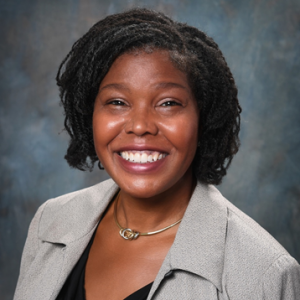
Tabbetha Dobbins
Dr. Tabbetha Dobbins is a Professor in the Dept. of Physics & Astronomy and Interim Vice President for Research and Dean of the Graduate School at Rowan University.
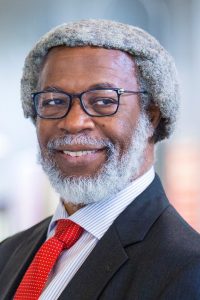
Jim Gates
Sylvester James “Jim” Gates, Jr., (born December 15, 1950) is an American theoretical physicist.
In 2006, he completed a DVD series titled Superstring Theory: The DNA of Reality for The Teaching Company composed of 24 half-hour lectures to make the complexities of unification theory comprehensible to non-physicists. In 2012, he was named a University System of Maryland Regents Professor, only the sixth person so recognized in the system’s history. He is a past president of the National Society of Black Physicists, and is a NSBP Fellow, as well as a Fellow of the American Physical Society, the American Association for the Advancement of Science, and the Institute of Physics in the U.K. In 2019 he was elected to the presidential line of the APS where he is currently serving as President-Elect. He also is an elected member of the American Academy of Arts and Sciences, and the American Philosophical Society. In 2013, he was elected to the National Academy of Sciences, becoming the first African-American theoretical physicist so recognized in its 150-year history. On November 16, 2013, Prof. Gates was awarded the Mendel Medal by Villanova University “in recognition of his influential work in supersymmetry, supergravity and string theory, as well as his advocacy for science and science education in the United States and abroad.” President Obama awarded Prof. Gates the 2011 National Medal of Science, the highest award given to scientists in the U.S., at a White House ceremony in 2013. During 2014, he was named the Harvard Foundation’s “Scientist of the Year.” In 2018, he was elected to serve in the presidential line as Vice President of the American Physical Society, moving to President Elect in 2020. In 2019, he was invited to serve on the American Bar Assoc Steering Committee for the Annual Prescription For Criminal Justice And Forensic Science. In 2020, he will begin serving on the Board of Trustees of the Mathematical Sciences Research Institute.
He continues to broadly engage video documentaries with appearances or cameos.
He currently continues his research in supersymmetry in systems of particles, fields, and strings.

Delilah Gates
Delilah Gates is a PhD candidate in physics at Harvard University and an NSF Graduate Research Fellow.
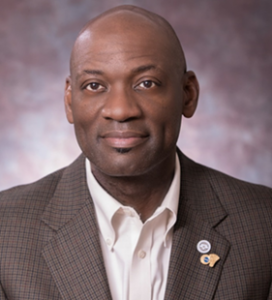
Willie S. Rockward
Dr. Rockward has a unique combination of leadership from academic, professional, and community experiences.
As Chair of Physics & DDEP at Morehouse College, his vision and leadership resulted in the department being the US #1 producer for underrepresented minorities with Bachelor of Science degrees in Physics according to the American Institute of Physics in conjunction to boasting the Nation’s most productive Dual Degree Engineering Program. He is a strong proponent of STEM mentorship using methodologies of faculty-to-student, peer-to-peer, professional shadowing, life-skills coaching, and research apprenticeship. His current research interests include micro/nano optics lithography, extreme ultraviolet interferometry, metamaterials, terahertz imaging, nanostructure characterization, and crossed phase optics.
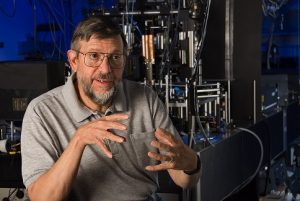
William Phillips
William D. Phillips received a B.S. in physics from Juniata College in 1970, and his Ph.D. from the Massachusetts Institute of Technology in 1976; after two years as a postdoctoral researcher at MIT, he joined NIST (then the National Bureau of Standards) to work on precision electrical measurements and fundamental constants.

Taharee Jackson
Taharee Jackson is the Diversity, Equity, and Belonging Officer at the American Institute of Physics.

Anisha Musti
Anisha, a 15 year old high school student from NYC, decided a year ago that she needed more of a community of like minded peers that share her interest in Quantum Tech.